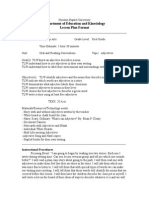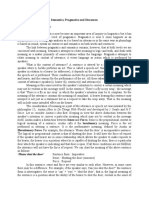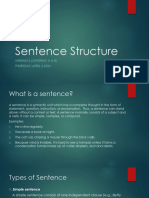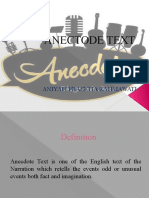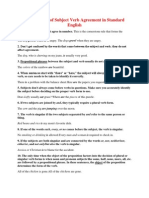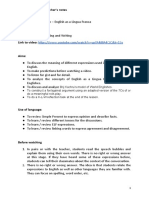Date
TYPES OF SPEECH
There are several types of speech, one can use to deliver a message, to sell an idea, to persuade, or impart
knowledge to audience.
1. ENTERTAINING SPEECH
The idea behind entertaining speech is to entertain the crowd and most speakers do that through illustrations,
funny stories and basic humor.
i. Entertaining speeches are informal and usually very short; they are speeches that provide a lot of
enjoyment and pleasure to the audience.
ii. Quite common or should say “familiar one” amongst the type of speeches in our contemporary society.
iii. One must master being witty or humorous to be considered to be a good entertaining speaker.
2. INFORMATIVE SPEECH
People who give informative speeches are there to present the audience with new information on a particular
subject.
i. They present “statistics and facts” about tolic susch as social and economic changes in the community
ii. Relying on the educational information, facts and various data so that the audience actually learns
something.
iii. The main goalof an informative speech is to provide enlightenment regarding a specific topic the
audience knows nothing about.
iv. It may demonstrate how to use a new type of software, explain a new concept in the field if science,
describe a expedition an archeologist took; or provide details about a person interest the audience
wants to learn more about.
3. PERSUASIVE SPEECH
Persuasive speech are there to PERSUADE the audience that an opinion expressed by the speaker is the
right one.
i. Persuasive speeches, depending on the topic, can also built around emotion and feeling of the speaker
and how the resonate with the audience;
ii. If younare trying to convince people to raise funding to a cause, to help children, elderly, oppressed
women, and so on.
iii. The facts are must, but ultimately in these situation appearing to the audience emotion should yield
better result.
OTHER TYPES OF SPEECHES
4. DEMONSTRATIVE SPEECH
i. The idea behind demonstrative speech is basically to educate audience that is listening to something
their not aware of.
ii. They include various visual aids which canhelp further demonstrate or describe in a practicable terms
how to effectively do something.
5. ORATORICAL SPEECHES
� i. Delivered in the style used by an orator. It’s nameis a little redundant because, “orator and oratorical”
both relate to the giving of speeches.
ii. These type of speech are usually given at a special celebration such an inauguration or ribbon-cutting
ceremony.
1. Long and formal speeches
a. Graduation
b. Inauguration
c. Funeral
2. Short and informal speeches
a. Toast
b. Special events
3. Other events
a. Birthday parties
b. Going away parties
c. Retirement parties
d. Others…
6. SPECIAL OCCASION SPEECH
i. Design to be short, usually ten minutrs or less; succinct and to the point; mood setting.
ii. Speeches usually don’t fall into any other category are usually classified as special occasion soeeches,
includes of the following;
1. Introduction speech-
Design to be short but interesting and to introduce upcoming speaker.
2. Tribute speech-
Design to pay tribute to someone either dead or alive.
3. Award acceptance speech-
Which are meant to thank someone for an awsrd and describe what an award means to you.
7. MOTIVATIONAL SPEECH
i. Unique type of speech and has a goal of self-improvement for the audience members.
ii. With a motivational speech, you can turn a negative situation to a positive one.
iii. Popular in business meetings with executives to complete a certain task, or to encourage employees to
sell more products or services.
iv. Can be found in elementary and highschool in order to motivate the students to do vetter on a test or in
a sporting event.
v. Great for inspiring people, lifting a person’s self-esteem, or even motivating an entire crowd of people.
8. DEBATE SPEECH
i. Debates are arguments that have rules and regardless of which style you choose, each side receives
the topic then has a certain amount of time to prepare to present it.
ii. Debate teams develop very valuable skills, including research skills, public speaking skills,
leadership skills, initiative skills, developing grace under pressure, critical thinking skills, and
developing arguments that are both logical and sound.
iii. Debaters also learn to think on their feet, which is why many people who join debate teams during
high school and college go on to become professional mediators or lawyers.
iv. Debates are somewhat different than persuasive speeches because you aren’t necessarily there to get
the other side to switch to your side; instead you are there, in essence, to justify why you believe a
certain thing.
Forms of debate speech
1. Parliamentary
2
� 2. Classical
3. Extemporaneous
4. Lincoln-douglas
5. Impromptu
6. Public-forum
7. Mock trial
8. Others…
GENERAL RULE OF DEBATE
Both sides get equaltime to discuss the issue and explain their view of the issue is the right one.
9. FORENSIC SPEECH
i. The term “forensic speech” merely refers to the practice and study of debate and public speaking.
ii. The reason why it is called forensics is that this practice is patterned after the competitions at
public forums during the period of ancient Greece.
iii. The speeches can take place inside a classroom, a national or international tournament, or even a
regional event. During the activity, students learn to research and speech skills in order to learn all
different types of speeches
iv. Forensic speeches allow students to perfect their craft under the supervision of experienced public
speakers and it can even be considered a type of “on-the-job training” because the students involved in
this activity are continuously honing their craft while practicing it at the same time.
10. EXPLANATORY SPEECH
i. Explanatory speech is one of the types of speech which is given to critically explain a situation or
thing.
ii. They are somewhat similar in nature to the demonstrative speech. However, the explanatory
speech is different from the demonstrative speech in the sense that the explanatory speech gives a
detailed step by step and breaks down of how to do something.
iii. It is also different in the sense that it does not make use of visual aid to assist in understanding.
iv. The explanatory speech simply just details the step by step to get the know-how on any task or subject.











